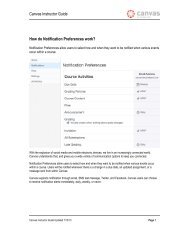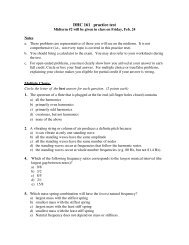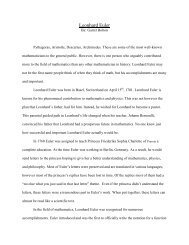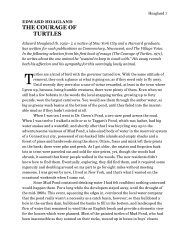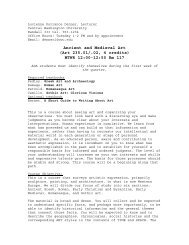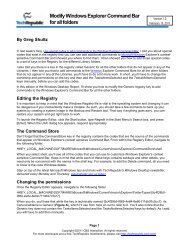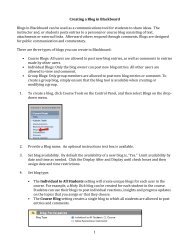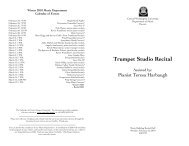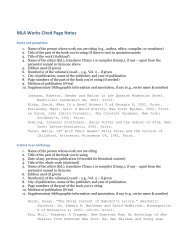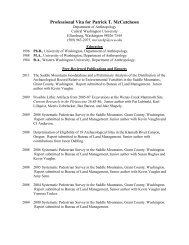The Ingenious Gentleman Don Quixote de la Mancha
The Ingenious Gentleman Don Quixote de la Mancha
The Ingenious Gentleman Don Quixote de la Mancha
You also want an ePaper? Increase the reach of your titles
YUMPU automatically turns print PDFs into web optimized ePapers that Google loves.
138 <strong>Don</strong> <strong>Quixote</strong> <strong>de</strong> <strong>la</strong> <strong>Mancha</strong> <br />
<br />
"That was only reasonable," replied Sancho, "for, by what your worship says, <br />
misfortunes belong more properly to knights‐errant than to their squires." <br />
<br />
"Thou art mistaken, Sancho," said <strong>Don</strong> <strong>Quixote</strong>, "according to the maxim quando <br />
caput dolet, etc." 8 <br />
<br />
"I don't un<strong>de</strong>rstand any <strong>la</strong>nguage but my own," said Sancho. <br />
<br />
"I mean to say," said <strong>Don</strong> <strong>Quixote</strong>, "that when the head suffers all the members <br />
suffer; and so, being thy lord and master, I am thy head, and thou a part of me as <br />
thou art my servant; and therefore any evil that affects or shall affect me should give <br />
thee pain, and what affects thee give pain to me." <br />
<br />
"It should be so," said Sancho; "but when I was b<strong>la</strong>nketed as a member, my head was <br />
on the other si<strong>de</strong> of the wall, looking on while I was flying through the air, and did <br />
not feel any pain whatever; and if the members are obliged to feel the suffering of <br />
the head, it should be obliged to feel their sufferings." <br />
<br />
"Dost thou mean to say now, Sancho," said <strong>Don</strong> <strong>Quixote</strong>, "that I did not feel when <br />
they were b<strong>la</strong>nketing thee? If thou dost, thou must not say so or think so, for I felt <br />
more pain then in spirit than thou didst in body. But let us put that asi<strong>de</strong> for the <br />
present, for we shall have opportunities enough for consi<strong>de</strong>ring and settling the <br />
point; tell me, Sancho my friend, what do they say about me in the vil<strong>la</strong>ge here? <br />
What do the common people think of me? What do the hidalgos? What do the <br />
caballeros? What do they say of my valor; of my achievements; of my courtesy? How <br />
do they treat the task I have un<strong>de</strong>rtaken in reviving and restoring to the world the <br />
now forgotten or<strong>de</strong>r of chivalry? In short, Sancho, I would have thee tell me all that <br />
has come to thine ears on this subject; and thou art to tell me, without adding <br />
anything to the good or taking away anything from the bad; for it is the duty of loyal <br />
<br />
8 “When the head aches,” the saying goes, “the body <strong>la</strong>nguishes.”





